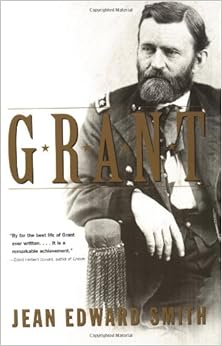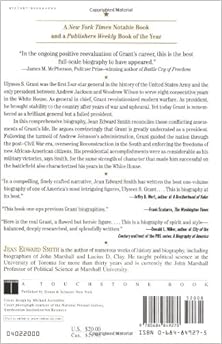Amazon.com Review
Hiram Ulysses Grant--mistakenly enrolled in the United States Military Academy as Ulysses Simpson Grant, and so known ever since--was a failure in many of the things to which he turned his hand. An indifferent, somewhat undisciplined cadet who showed talent for mathematics and painting, he served with unexpected distinction in the U.S. war against Mexico, then repeatedly went broke as a real-estate speculator, freighter, and farmer. His reputation was restored in the Civil War, in which he fulfilled a homespun philosophy of battle: "Find out where your enemy is. Get at him as soon as you can. Strike him as hard as you can and as often as you can, and keep moving on." Given to dark moods and the solace of the bottle (although far less so than his political foes made him out to be), Grant was ferocious in war, but chivalrous in peace, and offered generous terms to the defeated armies of Robert E. Lee. His enemies on the battlefield of politics showed him little honor, and they had a point: Grant's presidency was marked by a legion of corrupt lieutenants and hangers-on who built their fortunes on the back of a suffering people, and for whose actions Grant's reputation long has suffered.
Recent history has been kinder to Grant than were the chroniclers of his day, not only for his undoubted abilities as a military leader, but also for his conduct as a president who sought to rebuild a shattered nation. Jean Edward Smith, the author of fine biographies of John Marshall and Lucius D. Clay, offers compelling reasons to accept this program of revision, while acknowledging the shortcomings of Grant's administration. Surely and thoughtfully written, this sprawling but swiftly moving book stands as a true hallmark in the literature that is devoted to Grant. --Gregory McNamee
--This text refers to an out of print or unavailable edition of this title.
From Publishers Weekly
Grant's reputation as a general has steadily improved in the past quarter century, and the preceding decade has seen reevaluation of a presidency previously dismissed as an eight-year disaster. Smith, until now best known for his work in 20th-century U.S. foreign policy (George Bush's War), integrates Grant's career and achievements in what is by far the best comprehensive biography to date of a man who remains in enigma. A West Pointer who disliked the army enough to resign from it in 1854, Grant failed unobtrusively at every civilian enterprise he attempted. His return to arms in 1861 was marked by no spectacular triumph. Instead, from Shiloh through Vickburgh to Chattanooga, he established himself as the North's best general by a combination of flexibility, resilience and determination. Lee's unconditional surrender was accompanied by Grant's de facto pardon of the defeated army, and Smith persuasively interprets this as an early turning point of reconstruction, preventing Northern reprisals that might have left the nation permanently divided emotionally. Elected president in 1868, Grant above all sought reconciliation, yet made measured and effective use of the army to protect black rights in the south. Smith makes a strong case that the financial scandals that dogged Grant's second term reflected individual misfeasance rather than structural malaise-Grant was better at judging military subordinates than political advisers. His mediation of the Hayes-Tilden election in 1876 helped avert a national crisis. As a conqueror who was also a healer of war's wounds, Grant stands with no superiors and few equals, Smith forcefully argues. (Apr.) Forecast: The timing of this book is right, with Colin Powell as secretary of state and an election whose questions of black disenfranchisement and small electoral margin of victory are analogous to Hayes-Tilden. Add to that this book's comprehensiveness, rigor and readability, and it should do quite well.
Copyright 2001 Reed Business Information, Inc.
--This text refers to an out of print or unavailable edition of this title.







